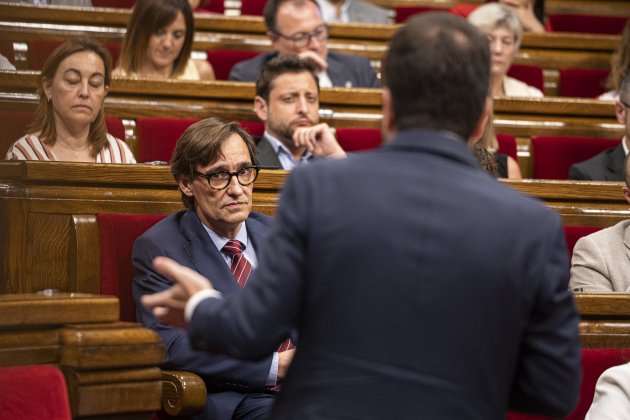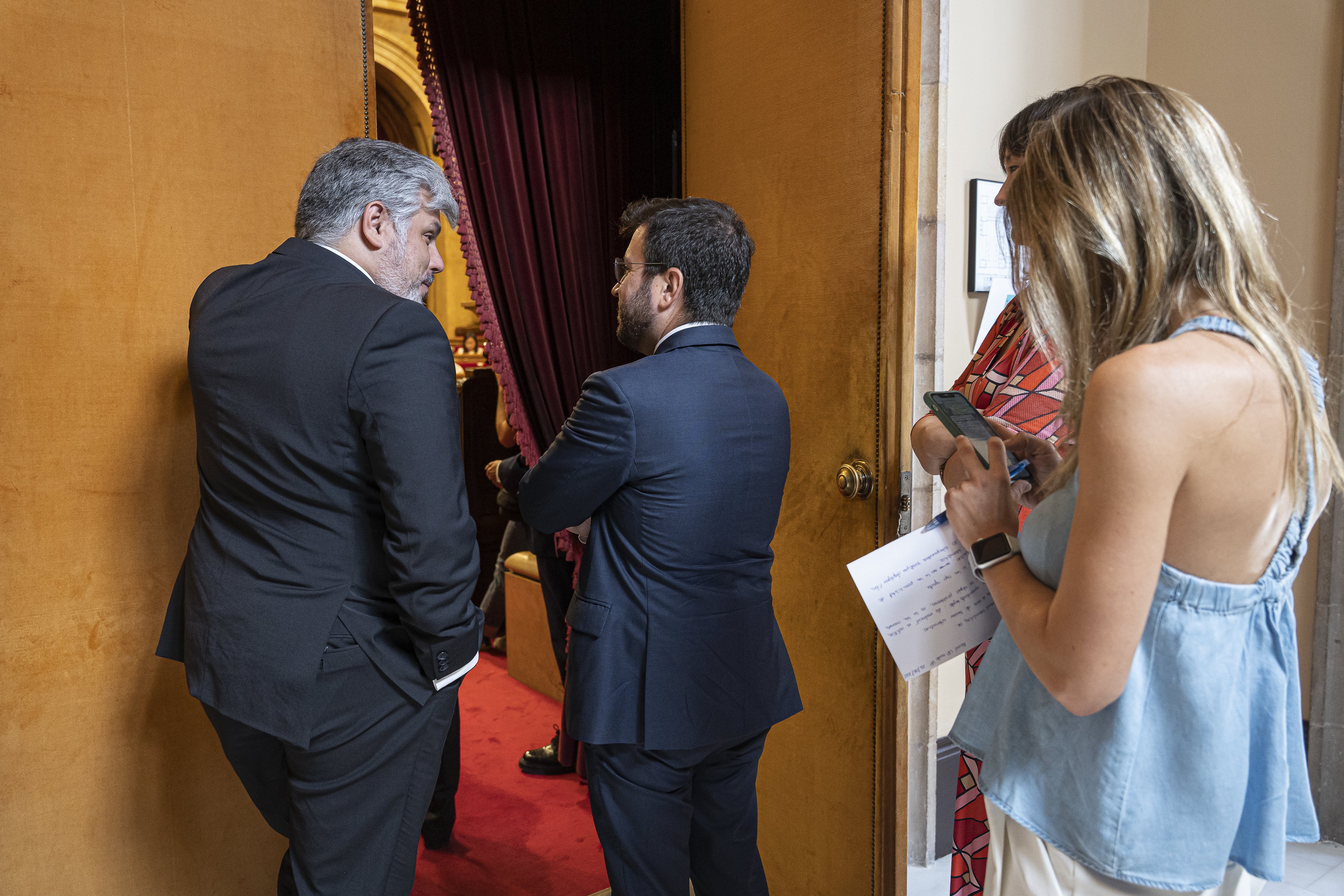The question session in the Catalan Parliament this Wednesday has allowed president Pere Aragonès to publicly make up with Junts, after the meeting between his minister Laura Vilagrà and Spanish counterpart Félix Bolaños last Wednesday had sparked tension between the two government partners. Together for Catalonia (Junts) complained that they had not been informed of the meeting and they distanced themselves without hesitation from their partners in the Republican Left (ERC). Today the president publicly guaranteed that the two partners will jointly agree on positions regarding relations with the government of the Kingdom of Spain. Aragonès was also conciliatory with the Catalan Socialists (PSC), after their leader Salvador Illa once again called for dialogue between parties in Catalonia.
On Monday, the ERC and Junts leaderships had met in their weekly coordination meeting, after days of tension. Aragonès was also present this time. The general secretary of Junts, Jordi Turull, reiterated during the meeting the criticisms that the party has aired publicly for not having been informed, before it was made public, of the meeting between Vilagrà and Bolaños last Wednesday in Madrid. This Tuesday, the government spokesperson, Patrícia Plaja, told the post-cabinet meeting press conference of the will between the governing partners for coordination over relations with the state, although she put to one side the meeting between Aragonès and Sánchez that was put on the agenda at the encounter in Madrid.
Junts, conciliatory
This Wednesday in the question session, Junts also exhibited a much more conciliatory tone towards ERC than in the last few days. Even after ironically saying that he has managed to be punctual in the chamber in spite of the mayor Ada Colau and the Socialist city councillor Jaume Collboni "making it very difficult to get into Barcelona", he congratulated the president in his saint's day.
Batet reiterated that Junts was calling for the dialogue table to "recognize" the political conflict and "respect" the sovereignty of Parliament and its parties, which by a large majority approved the conditions for the negotiation. He criticized that "in the last two years no Spanish government has put on the table any political proposal for Catalonia and that no government has stopped the repression [against Catalonia]; and asserted that Junts is willing to enter into negotiations if there are solid guarantees, with the elimination of vetoes and a solid agenda, built around the right to self-determination, as well as mechanisms for obtaining results. "If so Junts will be there and with the conviction that we must do it together, because before us we have the Spanish state, and we must take all possible precautions before it", he said.
Aragonès: joint positions
Aragonès admitted that they agree on "much" of the diagnosis; he concurred with the "very clear" assessment of a state that "denies the broad approaches of a majority of Catalan society"; and concluded that, for this reason, it is "essential to seize every opportunity to uphold these widely shared principles, the referendum and amnesty."
The president, however, recalled that for the last 12 years the Catalan government has always listened to the proposals for dialogue by the state, "be it more sincere or less so, or with more or less intention to reach agreements", even in the most complicated moments of October 2017. "We will do the same. In conditions, working together and setting out joint positions, which is easy to so," he assured. The president assured that he was in agreement with the "line" that the Junts deputy had just proposed, for what he defined as a "negotiation with much more strength". He did not refer explicitly to the dialogue table, but to positions such as the report by the Latvian socialist Boris Cilevics to the Council of Europe. "I think that's the way to do things and if we work together I think we'll find a way forward," he said.
PSC: collaboration
Socialist leader Salvador Illa also made dialogue the backbone of his speech, also with a strong conciliatory tone. In fact, he began his speech by acknowledging the work of the Catalan interior ministry officials and minister Joan Ignasi Elena for extinguishing the wildfires that hit Catalonia during the heatwave earlier this June.
Illa referred to the 550 million euros approved by the Spanish government for the rescue of steel producer Celsa, "the largest industrial rescue in the history of Spain", and recalled the confirmation of the Mobile World Congress in Barcelona until 2030. “The common denominator of these two news stories is collaboration,” he asserted, also explicitly acknowledging the role of the Catalan government and its president.

CUP
The dialogue with the state was also present in the speech by Dolors Sabater of the CUP, but in a very different tone. Sabater described the treatment received by Catalonia from the Spanish government as intolerable and described Aragonès's executive as "weak, submissive and lacking its own project". "Trains that do not arrive, budget breaches, schooling impositions, espionage and projects from the last century such as the Fourth Beltway... How many breaches are needed until it sets its own agenda, not subordinated to abuse," she asked. "Where is the government's own project and the independentist and transformation agenda? Where is the part that makes it worthwhile?"
"This government has its own agenda and if we could count on your support we would have more strength before the state," Aragonès replied. He warned that what the CUP considers "empty photos" are meetings to defend the resolution of the political conflict based on amnesty and self-determination.
Comuns: Winter Games
Deputy for the alternative left Comuns, David Cid, asked about "failed macro-projects" such as the expansion of the airport, and did so in the wake of the "failure of the Winter Games candidacy", on which he asserted that the government had spent half a million euros. “It’s not that the Winter Games have failed, it’s that it was already born as a failed project,” he denounced, in addition to demanding a U-turn in the Government’s strategy.
Aragonès, recalling that the expansion of the airport is also a project between the administrations of which the Comuns is part - the Spanish coalition government and the Barcelona city council - stated that his executive will continue working on this Games bid and will present a new project this July. "Today the citizens of the Pyrenees ask us to continue our commitment to this line," he said.
Ciudadanos: masks
From Ciudadanos, Carlos Carrizosa asked about the 36 million euros that the Catalan government had invested in masks, which arrived nine months late and involved a commission of 24 million for the intermediary. "What opinion does this business deserve," asked Carrizosa, who denounced that "one of the great opaque businesses in this country is healthcare."
Aragonès recalled that the anti-fraud office had analyzed this case and dismissed it, and that the audit office did not find any errors in it either; he argued that the market was blocked in May 2020. "You are not interested in the truth," he retorted.

